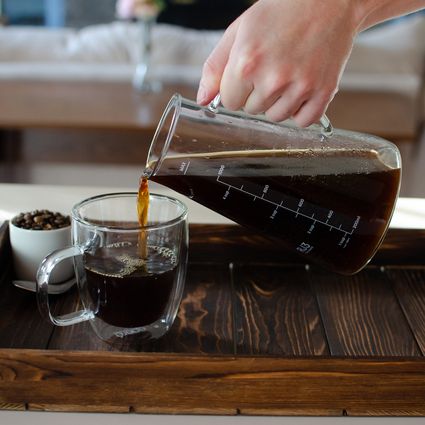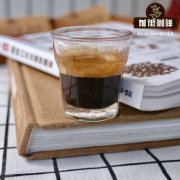Why does this cup of coffee cost $75? What coffee is the most expensive?

Professional coffee knowledge exchange more coffee bean information please follow the coffee workshop (Wechat official account cafe_style)
In the past few years, delicious food and specialty coffee have become popular all over the world. But what makes this particular coffee product so valuable-enough to get a value of $75 per cup?
When Panama's award-winning coffee began bidding within a few weeks, all eyes focused on how high the price would be.
This is because last year's auction set an all-time record: $803a pound (£640g) for the highest-rated beans: a variety called Elida Geisha, from a family plantation in a volcanic forest reserve in western Central America. The country. At the auction, only 100lb (45kg) of coffee was sold to buyers in China, Japan and Taiwan-as well as an American Los Angeles Klatch coffee.
Klatch won a 10-pound batch and recently became "the most expensive coffee in the world" at $75 a cup.
"when we think of the best wine or brandy, there are many similar pleasant drinks, and we don't flinch," said Darling Daniel, executive director of the Coffee Excellence Alliance, a nonprofit organization in Portland, Canada. Oregon, USA, supports small farms that produce specialty coffee around the world. High-quality coffee should also be treated, he said.
After all, a lot of people are making that cup of Joe.
Due to the oversupply, the price of commercial coffee is currently at a low level of less than $1 per pound. Large farms in countries such as Brazil-29 per cent of coffee imported from the European Union-make competition for small family farms challenging and unsustainable.
During the equally difficult recession of the late 1990s, competition and auctions for specialty coffee began to take off. Daniel says the goal is to get to know smallholder farmers and create a platform for them to connect with coffee buyers in the United States, Europe, Australia and Asia.
There are dozens of coffee competitions and auctions today. The Outstanding Cup, organized by the Outstanding Coffee Alliance, is called the Coffee Olympics and attracts farmers from 11 countries. Best Panama, the champion of Elida Geisha, also attracted a large number of international viewers. The coffee with the highest score in the competition sells for more than $1 a pound-not necessarily $803, but sometimes $100 to $300 per pound.
When we think of the best wine or brandy, there are many similar pleasant drinks, and we don't flinch.-Darling Daniel
"it's good for farmers and rewarding for consumers," said Ric Reinhardt, honorary executive director of the American Special Coffee Association (SCAA). "Farmers improve their lives and consumers enjoy better products."
Elida Geisha comes from a small farm in Boquete, Panama, and is run by four generations of the Lamastus family. Elida is the name of the hostess who manages the farm and raises the family on her own after losing her husband when she was young.
Although the family has been growing coffee for more than a century, Elida Geisha is quite new. Wilford Lamastus Jr, the fourth-generation coffee maker at Lamastus Family Estates, says family farms have long struggled and lost money. In addition to coffee, the farm grows onions, berries and melons to make ends meet. "anyone in their right mind will say: & # 39; We are losing money. We had to give up, "the Lama recalled.
But the family decided to double their coffee. His father helped set up the Panamanian Coffee Association, joined other coffee farmers in the region, and organized the best competition in Panama. In 2004, the team reached a turning point when another family farm, Hacienda La Esmeralda, came across a rare variety of coffee called geisha. It stood out in that year's competition, earning $21 per pound and setting a record. Soon, other farmers, including the Lamastus family, tried to grow the variety.
This is the best cup I've ever enjoyed in my life.-Michael Perry.
The coffee strain, also known as Gesha, originated in the 1930s from the Gesha region of Ethiopia (not associated with a Japanese geisha). The seeds eventually reached the research center in Costa Rica around the 1960s and then reached Panama. Farmers find that this variety is very hardy and can survive some diseases, but it produces very little coffee and the coffee is not delicious.
Over the years, it has been ignored. Then the Peterson family from Hacienda La Esmeralda stumbled upon the change while investigating their farm. Growing them at higher altitudes, they found that they produced a unique, distinct flavor.
"you may occasionally come across one or two [flower and / or fruit] notes in a cup of coffee," Reinhard said. But as the geisha changes, "you will encounter a complete symphony of these notes."
The Lamastus family bought and planted the first seeds in 2006. It took eight years-much longer than most coffee varieties-to harvest. It is difficult for trees to grow. Lamastus estimates that 20 per cent of people die during transfer from nurseries, while others die as a result of overexposure to elements at such high altitudes.
But Ramastus says they also have high-quality planting land, rich volcanic soil, a unique microclimate at high elevations, and a central location between the Caribbean and the Pacific. Picking and processing beans requires great attention to detail in order to enhance the taste of coffee. About 20% of the 65 hectares of land on the farm is now used for geisha varieties, and they are trying to increase it.
In 2018, Elida Geisha of the Lamastus family won the same category. This year, Elida Geisha Natural and Elida Geisha Washed's family won twice. The online auction of coffee-100 pounds each-will take place in mid-July.
Michael Perry, the barbecue master and buyer of Klatch, was one of the judges of last year's best competition in Panama. He was a member of the international jury who tasted coffee blindly and rated it with a score of 100. Perry awarded the Elida Geisha Natural a score of 97.
"this is the best cup I've ever enjoyed in my life," Perry said, although he did leave a small room in case there was a better situation in the future.
Perry later worked with a group of buyers such as Taiwan's Black Gold Group to bid for coffee. The online auction lasted late into the night because of jet lag, but he knew they had successfully bought the award-winning item.
With the cost of shipping and preparing coffee, Perry estimates that the final cost is close to $1000 per pound, producing about 80 cups of coffee per pound. Klatch has turned it into an experience: at private events, customers not only sip a rare and elusive cup of coffee, but also learn about its origins.
"even those who pay for coffee don't know why they pay so much," said Heather Perry, president and vice president of Klatch and SCAA. "therefore, it helps to add context."
Daniel Walsh is one of Klatch's customers who paid the price for tasting an award-winning beer. As a beverage industry worker and self-proclaimed coffee snob, Walsh grinds and pours coffee beans while he travels to prepare his cup every morning.
"obviously, you're not going to pay $75 a day for a cup," Walsh said. "but you buy a nice bottle of wine or whisky, and you only have to pay a lot of money for bracelets or shoes that you wear only once. I like coffee and I wish I could say & # 39; I tasted it. "
Walsh tasted it, drank his black, and tasted the unusual fruit and flower aromas of coffee. It confirmed his purchase decision. "you just don't get it in your daily coffee," he said.
END
Important Notice :
前街咖啡 FrontStreet Coffee has moved to new addredd:
FrontStreet Coffee Address: 315,Donghua East Road,GuangZhou
Tel:020 38364473
- Prev

Why do beverage industry giants launch carbonated coffee one after another? Is the carbonated coffee good?
Professional coffee knowledge exchange more coffee bean information Please follow Coffee Workshop (Wechat official account cafe_style) in recent years, carbonated beverage giants have paid more and more attention to the coffee market. Coca-Cola bought the British coffee chain Costa for $5.1 billion in 2018. With the growth of the coffee market, more and more beverage companies have joined the game. In early May this year, China's largest
- Next

Vietnamese people can't go without coffee, but why add condensed milk to drink?
Professional coffee knowledge exchange More coffee bean information Please pay attention to coffee workshop (Weixin Official Accounts cafe_style) Coffee drinking is the most common social activity of Saigon people, and it is also an indispensable part of life. Often from 7 a.m. to night, Saigon people can be seen sitting on low plastic chairs with coffee everywhere on the roadside, either in a daze or watching the passing people.
Related
- Can lightly roasted coffee beans be used to extract espresso? How finely should you grind high-quality coffee beans to make Italian latte?
- What is the difference between the world's top rose summer coffee and Yejia Shefi? What are the flavor characteristics of Yega Shefi coffee and Panama rose summer?
- The ceremony is full! Starbucks starts to cut the ribbon at a complimentary coffee station?!
- A whole Michelin meal?! Lucky launches the new "Small Butter Apple Crispy Latte"
- Three tips for adjusting espresso on rainy days! Quickly find the right water temperature, powder, and grinding ratio for espresso!
- How much hot water does it take to brew hanging ear coffee? How does it taste best? Can hot water from the water dispenser be used to make ear drip coffee?
- What grade does Jamaica Blue Mountain No. 1 coffee belong to and how to drink it better? What is the highest grade of Blue Mountain coffee for coffee aristocrats?
- What are the flavor characteristics of the world-famous coffee Blue Mountain No. 1 Golden Mantelin? What are the characteristics of deep-roasted bitter coffee?
- Can I make coffee a second time in an Italian hand-brewed mocha pot? Why can't coffee be brewed several times like tea leaves?
- Hand-brewed coffee flows with a knife and a tornado. How to brew it? What is the proportion of grinding water and water temperature divided into?

